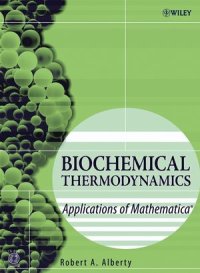
Ebook: Biochemical Thermodynamics: Applications of Mathmatica
Author: Robert A. Alberty(auth.)
- Series: Methods of Biochemical Analysis
- Year: 2006
- Language: English
- pdf
Navigate the complexities of biochemical thermodynamics with Mathematica(r)
Chemical reactions are studied under the constraints of constant temperature and constant pressure; biochemical reactions are studied under the additional constraints of pH and, perhaps, pMg or free concentrations of other metal ions. As more intensive variables are specified, more thermodynamic properties of a system are defined, and the equations that represent thermodynamic properties as a function of independent variables become more complicated.
This sequel to Robert Alberty's popular Thermodynamics of Biochemical Reactions describes how researchers will find Mathematica(r) a simple and elegant tool, which makes it possible to perform complex calculations that would previously have been impractical. Biochemical Thermodynamics: Applications of Mathematica(r) provides a comprehensive and rigorous treatment of biochemical thermodynamics using Mathematica(r) to practically resolve thermodynamic issues.
Topics covered include:
* Thermodynamics of the dissociation of weak acids
* Apparent equilibrium constants
* Biochemical reactions at specified temperatures and various pHs
* Uses of matrices in biochemical thermodynamics
* Oxidoreductase, transferase, hydrolase, and lyase reactions
* Reactions at 298.15K
* Thermodynamics of the binding of ligands by proteins
* Calorimetry of biochemical reactions
Because Mathematica(r) allows the intermingling of text and calculations, this book has been written in Mathematica(r) and includes a CD-ROM containing the entire book along with macros that help scientists and engineers solve their particular problems.Content:
Chapter 1 Thermodynamics of the Dissociation of Weak Acids (pages 1–27):
Chapter 2 Introduction to Apparent Equilibrium Constants (pages 29–42):
Chapter 3 Biochemical Reactions at Specified Temperature and Various pHs (pages 43–70):
Chapter 4 Biochemical Reactions at Various pHs and Various Temperatures (pages 71–107):
Chapter 5 Biochemical Reactions at Specified pHs, pMgs, and Various Temperatures (pages 109–129):
Chapter 6 Development of a Database on Species (pages 131–147):
Chapter 7 Uses of Matrices in Biochemical Thermodynamics (pages 149–172):
Chapter 8 Oxidoreductase Reactions (Class 1) at 298.15 K (pages 173–208):
Chapter 9 Transferase Reactions (Class 2) at 298.15 K (pages 209–219):
Chapter 10 Hydrolase Reactions (Class 3) at 298.15 K (pages 221–241):
Chapter 11 Lyase Reactions (Class 4), Isomerase Reactions (Class 5), and Ligase Reactions (Class 6) at 298.15 K (pages 243–258):
Chapter 12 Survey of Reactions at 298.15 K (pages 259–319):
Chapter 13 Survey of Reactions at Various Temperatures (pages 321–353):
Chapter 14 Thermodynamics of the Binding of Ligands by Proteins (pages 355–364):
Chapter 15 Calorimetry of Biochemical Reactions (pages 365–379):
Chemical reactions are studied under the constraints of constant temperature and constant pressure; biochemical reactions are studied under the additional constraints of pH and, perhaps, pMg or free concentrations of other metal ions. As more intensive variables are specified, more thermodynamic properties of a system are defined, and the equations that represent thermodynamic properties as a function of independent variables become more complicated.
This sequel to Robert Alberty's popular Thermodynamics of Biochemical Reactions describes how researchers will find Mathematica(r) a simple and elegant tool, which makes it possible to perform complex calculations that would previously have been impractical. Biochemical Thermodynamics: Applications of Mathematica(r) provides a comprehensive and rigorous treatment of biochemical thermodynamics using Mathematica(r) to practically resolve thermodynamic issues.
Topics covered include:
* Thermodynamics of the dissociation of weak acids
* Apparent equilibrium constants
* Biochemical reactions at specified temperatures and various pHs
* Uses of matrices in biochemical thermodynamics
* Oxidoreductase, transferase, hydrolase, and lyase reactions
* Reactions at 298.15K
* Thermodynamics of the binding of ligands by proteins
* Calorimetry of biochemical reactions
Because Mathematica(r) allows the intermingling of text and calculations, this book has been written in Mathematica(r) and includes a CD-ROM containing the entire book along with macros that help scientists and engineers solve their particular problems.Content:
Chapter 1 Thermodynamics of the Dissociation of Weak Acids (pages 1–27):
Chapter 2 Introduction to Apparent Equilibrium Constants (pages 29–42):
Chapter 3 Biochemical Reactions at Specified Temperature and Various pHs (pages 43–70):
Chapter 4 Biochemical Reactions at Various pHs and Various Temperatures (pages 71–107):
Chapter 5 Biochemical Reactions at Specified pHs, pMgs, and Various Temperatures (pages 109–129):
Chapter 6 Development of a Database on Species (pages 131–147):
Chapter 7 Uses of Matrices in Biochemical Thermodynamics (pages 149–172):
Chapter 8 Oxidoreductase Reactions (Class 1) at 298.15 K (pages 173–208):
Chapter 9 Transferase Reactions (Class 2) at 298.15 K (pages 209–219):
Chapter 10 Hydrolase Reactions (Class 3) at 298.15 K (pages 221–241):
Chapter 11 Lyase Reactions (Class 4), Isomerase Reactions (Class 5), and Ligase Reactions (Class 6) at 298.15 K (pages 243–258):
Chapter 12 Survey of Reactions at 298.15 K (pages 259–319):
Chapter 13 Survey of Reactions at Various Temperatures (pages 321–353):
Chapter 14 Thermodynamics of the Binding of Ligands by Proteins (pages 355–364):
Chapter 15 Calorimetry of Biochemical Reactions (pages 365–379):
Download the book Biochemical Thermodynamics: Applications of Mathmatica for free or read online
Continue reading on any device:

Last viewed books
Related books
{related-news}
Comments (0)